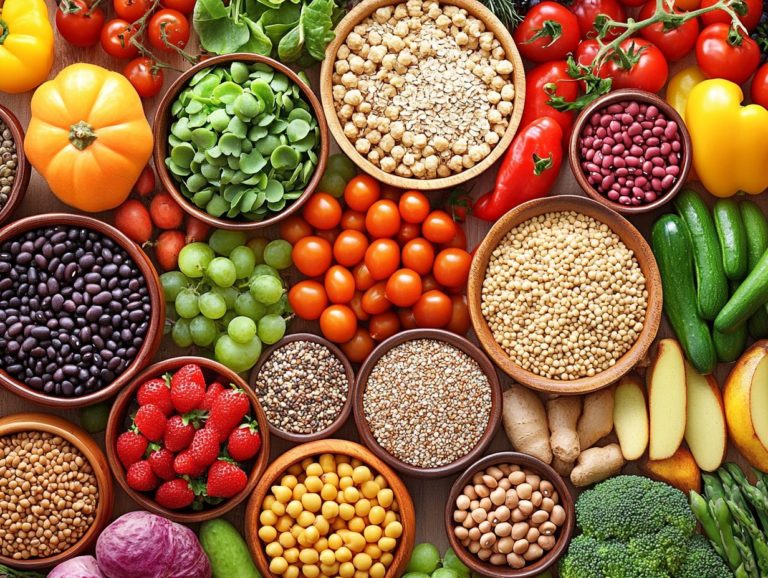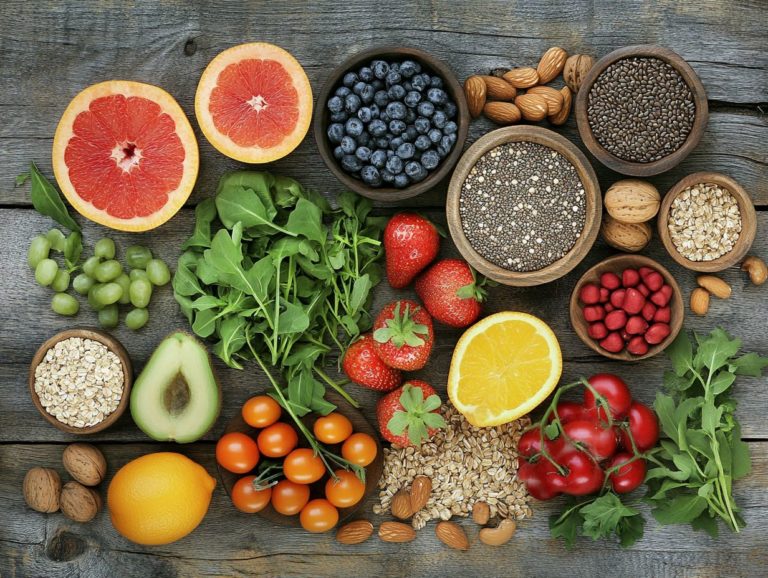How to Balance Your Diet with Holistic Nutrition?
Holistic nutrition transcends the mere act of eating; it involves a deep understanding of how food influences your overall health and well-being.
This exploration delves into the principles of holistic nutrition, highlighting the importance of a balanced diet and its transformative impact on your life.
You ll uncover essential components that make up a holistic diet, alongside practical tips for effective meal planning, and appreciate the vital roles of mindful eating and physical activity.
Start your exciting journey today to nourish both your body and mind in a truly holistic manner.
Contents
- Key Takeaways:
- What You Need to Know About Holistic Nutrition
- The Importance of a Balanced Diet
- Key Elements of a Holistic Diet
- Creating a Well-Rounded Meal Plan
- Additional Factors for a Holistic Diet
- Frequently Asked Questions
- How can I balance my diet with holistic nutrition?
- What is the importance of balancing your diet with holistic nutrition?
- Are there any specific foods I should avoid in a holistic nutrition diet?
- How does holistic nutrition differ from traditional nutrition?
- Can I still meet my nutritional needs with a holistic nutrition diet?
- Do I need to follow a strict diet plan for holistic nutrition?
Key Takeaways:

- Understand the concept of holistic nutrition and its focus on overall health and well-being.
- Incorporate whole foods and balance proteins, fats, and carbohydrates that your body needs for a holistic approach to eating.
- Practice mindful eating and include physical activity to enhance the benefits of a balanced, holistic diet.
What You Need to Know About Holistic Nutrition
Understanding holistic nutrition requires a comprehensive perspective on health, emphasizing the intricate connection between your food choices, emotional well-being, and overall mental health. If you’re wondering how to start your holistic nutrition journey, it acknowledges that optimal nutrition extends beyond merely what you eat; it also encompasses how those choices influence your emotional resilience and physical health.
By incorporating whole, nutrient-rich foods into your diet, you can connect your mind and body, ultimately enhancing your emotional well-being and minimizing health risks.
What is Holistic Nutrition?
Holistic nutrition invites you to explore a health approach that emphasizes the intricate relationship between food, emotional well-being, and the mind-body connection. It’s about recognizing that what you consume has a direct impact on your mental state and the absorption of nutrients, as outlined in the key principles of holistic nutrition.
This comprehensive philosophy goes beyond counting calories or following the latest diet trends. Instead, it highlights the quality of the foods you choose and their ability to nourish both your body and mind. At its essence, holistic nutrition champions whole, unprocessed foods abundant in essential nutrients, including foods essential in holistic nutrition, which are crucial for both physical health and emotional stability.
By grasping how each nutrient influences bodily functions and affects your mood, you can cultivate a balanced relationship with food that enhances your overall wellness. This approach encourages a deeper awareness of your eating habits, paving the way for improvements in digestion, energy levels, and mood. Ultimately, it leads to a more harmonious and fulfilling lifestyle.
The Importance of a Balanced Diet
A balanced diet is essential for achieving optimal health, as it supplies the vital nutrients your body needs while also significantly contributing to emotional resilience and stress management.
By indulging in a diverse array of nutrient-rich foods, you can satisfy your dietary requirements and enhance both your physical and mental well-being.
Impact on Overall Health and Well-being
The impact of a balanced diet on your overall health is profound, as it enhances nutrient absorption and supports your mental and emotional well-being.
When you consistently consume a variety of foods rich in essential vitamins and minerals, you lay down a strong foundation for your physical health. This diverse intake not only fuels your body but also plays a crucial role in regulating your mood and cognitive functions.
Choose nutrient-rich meals now to boost your energy and happiness. This improved nutrition can lead to greater emotional resilience, equipping you with the strength to navigate life s challenges.
Ultimately, the synergy between physical nourishment and mental clarity showcases the holistic benefits of maintaining a balanced diet.
Key Elements of a Holistic Diet

A holistic diet emphasizes whole foods, lean proteins, healthy fats, and fresh fruits, crafting a balanced approach that nurtures both your body and mind. By prioritizing these essential elements and learning how to create a holistic nutrition meal plan, you can align your dietary choices with your health aspirations and enhance your emotional resilience.
Join our community for more tips on living a holistic lifestyle!
Incorporating Whole Foods
Incorporating whole foods into your diet is crucial for enhancing nutrition and fostering a deeper connection with your community, all while promoting environmental consciousness.
When you prioritize these unprocessed options, you boost your intake of important nutrients and strengthen your ties with local farmers and food producers. This practice creates a thriving food community!
Whole foods offer profound benefits, like improved health outcomes and richer flavors. They also spark conversations about shared values and environmental stewardship. Each bite creates positive ripple effects, inspiring those around you to reflect on the broader impacts of their dietary choices. Ultimately, this nurtures a more health-conscious and eco-friendly society.
Balancing Macronutrients
Balancing macronutrients like healthy fats and lean proteins is essential for maintaining a diet that optimizes nutrient absorption and supports your overall health.
Carbohydrates provide the energy your body needs for daily activities and cognitive functions. Each macronutrient has its unique contribution: healthy fats assist in absorbing fat-soluble vitamins and provide essential fatty acids that your body can’t produce on its own. Lean proteins are proteins that are low in fat and are critical for muscle repair and growth, helping to keep your body strong and resilient.
By embracing a well-rounded meal plan with the right proportions of these macronutrients, you can establish a solid foundation for improved vitality and well-being, setting the stage for sustainable health.
Creating a Well-Rounded Meal Plan
Crafting a well-rounded meal plan requires thoughtful consideration of food choices that emphasize nutrient-dense options. It s essential to prioritize adequate hydration and embrace mindful eating practices, allowing you to nourish both your body and mind effectively.
Tips for Meal Planning and Preparation
Effective meal planning and preparation thrive when you immerse yourself in food-centered activities like cooking classes and community gardens.
By participating in local cooking classes, you sharpen your culinary skills and gain invaluable insights into seasonal ingredients and nutritious recipes. This not only cultivates a sense of community but also sparks your creativity in the kitchen.
Community gardens present an exceptional opportunity to grow your own fresh produce. This allows you to reconnect with the very source of your food. Incorporating vegetables and herbs straight from these gardens into your planned meals can elevate flavors and encourage healthier eating habits.
Together, these experiences promote a sustainable approach to food, paving the way for a more enriching culinary journey.
Additional Factors for a Holistic Diet

Additional factors for a holistic diet go beyond mere food choices. Consider incorporating mindful eating and engaging in regular physical activity.
These elements improve food security and boost your overall well-being.
Importance of Mindful Eating
Mindful eating cultivates a heightened awareness of food, enhancing your emotional resilience and fostering a healthier relationship with what you consume.
This approach encourages you to slow down and savor each bite, allowing for a deeper appreciation of flavors and textures, leading to more satisfying meals.
Practicing mindfulness during meals helps you recognize your hunger cues and emotional triggers, making it easier to distinguish between genuine hunger and emotional eating.
This increased awareness guides you toward better food choices and fortifies your emotional resilience, giving you the power to respond to your feelings in a healthier manner. Incorporating techniques such as chewing slowly, appreciating the origins of your food, and engaging all your senses can significantly elevate your overall well-being, marking a crucial shift toward a more intentional and balanced lifestyle.
Incorporating Physical Activity
Incorporating physical activity into your daily routine is essential for holistic health. It helps manage stress and fosters connection within your community.
Engaging in regular exercise boosts your physical well-being. It also enhances mental clarity and emotional resilience.
Group sports, yoga sessions, and community walks let you bond with others. These activities create support networks that elevate overall well-being.
The social aspect of these activities greatly reduces feelings of loneliness and isolation. This makes it easier to navigate daily stresses.
Prioritizing movement enhances your health and contributes to a more supportive community atmosphere. Get moving and feel the difference!
Frequently Asked Questions
How can I balance my diet with holistic nutrition?
Holistic nutrition focuses on nourishing the body as a whole, rather than just individual nutrients. To learn how to build a balanced plate with holistic nutrition, aim to eat a variety of whole, unprocessed foods, including fruits, vegetables, whole grains, and healthy fats.
What is the importance of balancing your diet with holistic nutrition?

Balancing your diet with holistic nutrition improves energy levels and digestion. It strengthens your immune function and enhances overall health.
Are there any specific foods I should avoid in a holistic nutrition diet?
Holistic nutrition promotes mostly whole foods. While there are no foods you must avoid, limiting processed foods and added sugars can enhance your diet. For more insights, check out the benefits of holistic nutrition.
How does holistic nutrition differ from traditional nutrition?
Traditional nutrition focuses on individual nutrients, while holistic nutrition considers the body as a whole. It emphasizes the interconnectedness of different body systems.
Can I still meet my nutritional needs with a holistic nutrition diet?
Absolutely! A balanced holistic nutrition diet provides all essential nutrients and emphasizes whole, nutrient-dense foods. If you’re interested in tracking your progress, you might want to learn how to create a holistic nutrition diary instead of relying on supplements.
Do I need to follow a strict diet plan for holistic nutrition?
No, holistic nutrition is not one-size-fits-all. It encourages personalized eating habits based on your needs and preferences.






